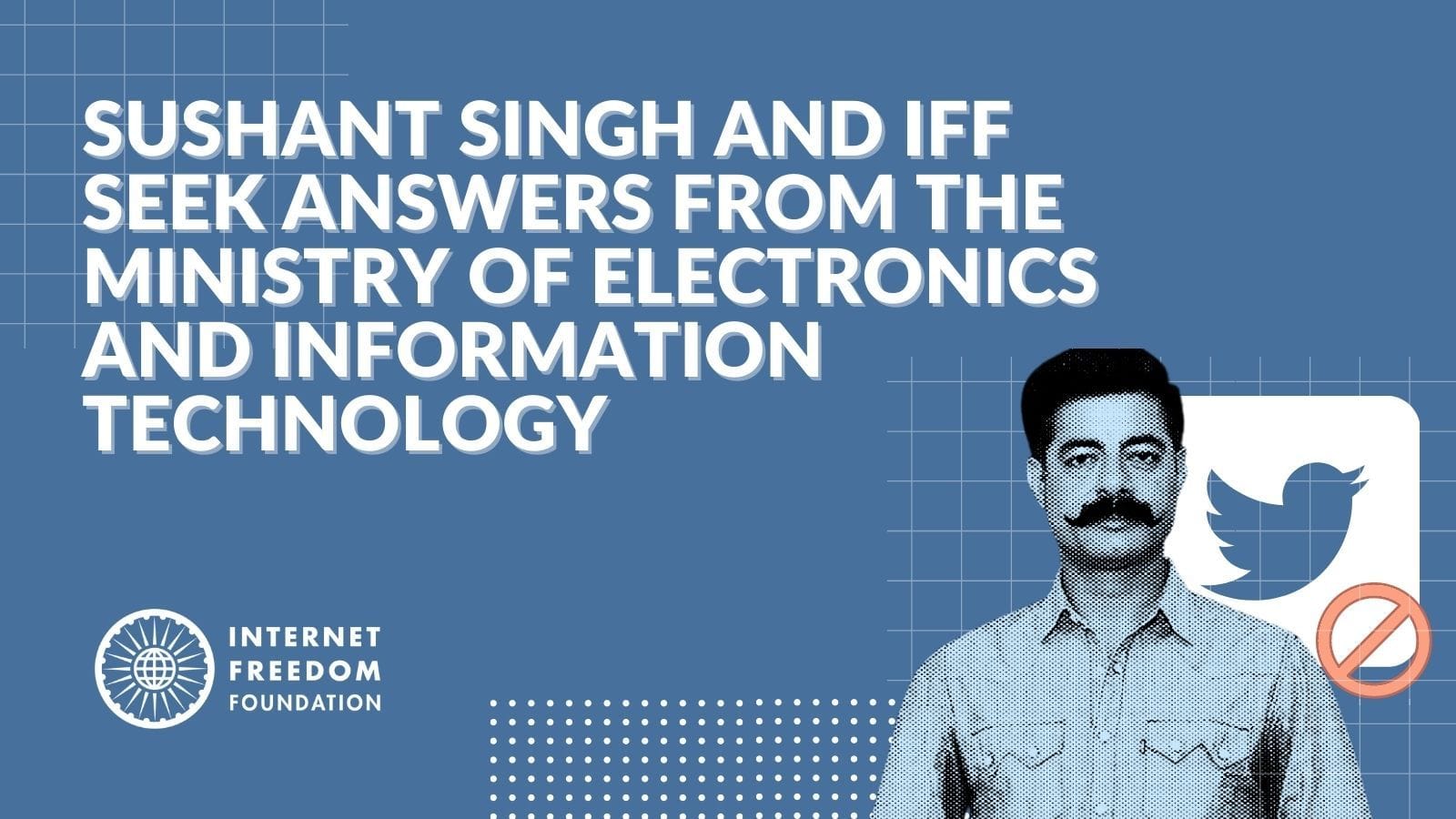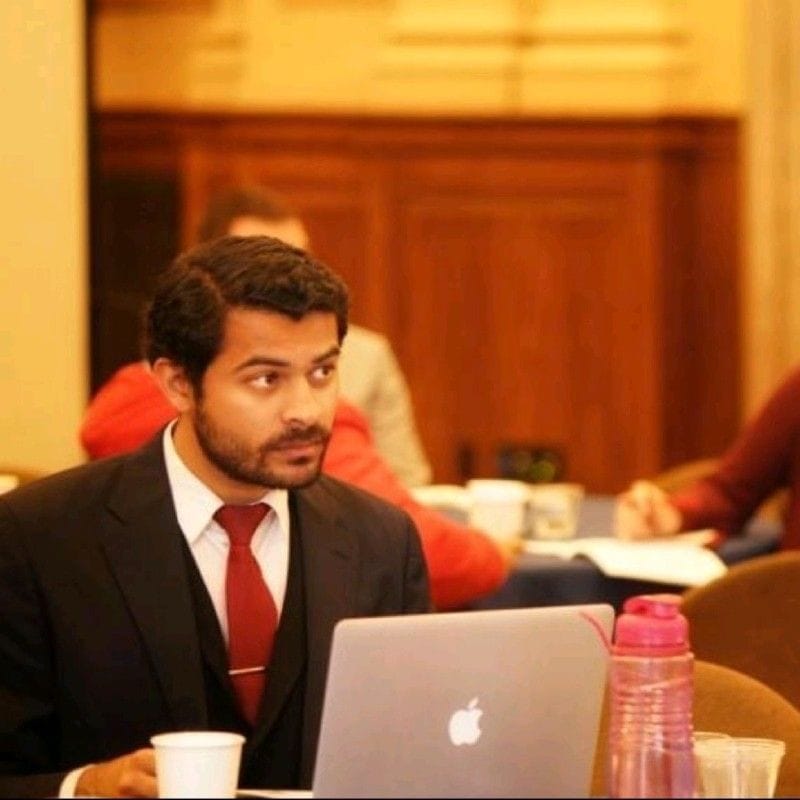
tl;dr
Twitter unilaterally and arbitrarily suspended the account of Sushant Singh (@sushant_says) twice, i.e. on February 1 and May 26, 2021. The first time, Twitter sent him an email stating that the account had been restricted due to a specific tweet posted on the account. However, for the second suspension, no information was or has been provided by Twitter to Mr. Singh till date. We helped him send a representation to Twitter urging an open dialogue on its policy. We also helped him file RTI requests with the Ministry of Electronics and IT (MeitY), the Department of Telecommunications (DoT) and the Ministry of Home Affairs (MHA). In their replies, DoT and MHA stated that they had no records of any such blocking and transferred the RTI to MeitY. However, Meity invoked the 2009 Blocking Rules (defined below) and an exemption under the Right to Information Act, 2005 (the RTI Act) to deny information to Mr. Singh.
Background
On February 1, 2021, and May 26, 2021, Twitter temporarily, unilaterally and arbitrarily suspended the account of Sushant Singh (@sushant_says), an actor, author and presenter. The account (in operation since September 2010) was verified on August 19, 2020 and has approximately 247K followers. Mr. Singh is an active voice against hatred, bigotry and fascism on Twitter and is also associated with another Twitter account, @TeamSaath, as their Goodwill Ambassador.
On June 22, 2021, we assisted Mr. Singh in sending a representation to Twitter urging Twitter to provide information regarding suspension of his account, @sushant_says, on 01.02.2021 and 26.05.2021.The information we sought included (but was not limited to) the following:
- the basis of the takedown notice(s);
- if takedown was pursuant to a legal request from the government/agencies under Section 69A of the Information Technology Act, 2000 (the IT Act), or any other legal provision, then copies of the said legal requests and all objections/replies sent by Twitter;
- if the takedown was pursuant to Twitter’s community guidelines and terms of service, details of specific provisions that were violated and reasons for the decision to regulate content;
- In any case, details of the offending tweets, duration of the suspension and reasons for restricting access to the account in entirety rather than blocking access to specific tweets.
We filed RTIs to find out more about this
We also assisted him in filing RTIs with the DoT, MeitY and the MHA seeking information regarding the account suspensions. According to the IT Act and the Information Technology (Procedure and Safeguards for Blocking for Access of Information by Public) Rules, 2009 (the 2009 Blocking Rules), a Designated Officer at MeitY is empowered to issue directions to intermediaries (such as Twitter) to block access to certain content that is required to be removed “in the interest of sovereignty and integrity of India, defence of India, security of the State, friendly relations with foreign States or public order or for preventing incitement to the commission of any cognizable offence relating to above.”
The RTIs in brief sought whether:
- the said account had been blocked pursuant to an order under Section 69A of the IT Act read with 2009 Blocking Rules or any other provision of law;
- Twitter Inc. was given notice and an opportunity of hearing;
- any effort was made to identify the originator of content on the said account under Rule 8(1) of the 2009 Blocking Rules;
- any complaint was received regarding the said account;
- a Review Committee, pursuant to Rule 6 of the Blocking Rules, 2009, was constituted to determine whether it was necessary to restrict the account belonging to Sushant Singh; and
- a Committee for examination of requests, pursuant to Rule 7 of the IT Rules, 2009, was constituted to determine whether it was necessary to restrict the account belonging to the applicant.
The RTIs also asked MeitY to provide a copy of all documents related to the queries asked.
MeitY denied any information relating to blocking orders
While DoT and MHA replied stating they had no information regarding Sushant Singh’s account, MeitY has claimed that any information regarding blocking is not only confidential under Rule 16 of the 2009 Blocking Rules, but is also related to national security, sovereignty and integrity, and is thus exempt under Rule 8(1)(a) of the RTI Act.
This reply proceeds under an incorrect understanding of the application of Rule 16 of the 2009 Blocking Rules. The Hon’ble Supreme Court in Shreya Singhal v. Union of India (2015) 5 SCC 1, held:
“114. It will be noticed that Section 69-A unlike Section 66-A is a narrowly drawn provision with several safeguards. First and foremost, blocking can only be resorted to where the Central Government is satisfied that it is necessary so to do. Secondly, such necessity is relatable only to some of the subjects set out in Article 19(2). Thirdly, reasons have to be recorded in writing in such blocking order so that they may be assailed in a writ petition under Article 226 of the Constitution.
115. The Rules further provide for a hearing before the Committee set up—which Committee then looks into whether or not it is necessary to block such information. It is only when the Committee finds that there is such a necessity that a blocking order is made. It is also clear from an examination of Rule 8 that it is not merely the intermediary who may be heard. If the “person” i.e. the originator is identified he is also to be heard before a blocking order is passed. Above all, it is only after these procedural safeguards are met that blocking orders are made and in case there is a certified copy of a court order, only then can such blocking order also be made. It is only an intermediary who finally fails to comply with the directions issued who is punishable under sub-section (3) of Section 69-A.” (emphasis supplied)
It is clear from the above that Mr. Singh ought to have been afforded a hearing before a blocking order was passed in respect of his Twitter account. Mr Singh is also entitled to know the reasons why his account was blocked. Not only did Meity not comply with these legal obligations, it is also refusing to provide any information at all in respect of such blocking.
We have assisted Mr. Singh in filing a first appeal before the First Appellate Authority at Meity against the RTI responses . In the said appeal, we have submitted that the CPIO’s reliance on Rule 16 of the 2009 Blocking Rules is an erroneous application of the said Rule, and is based on an incorrect understanding of the law laid down in this regard by the Hon’ble Supreme Court. We also submitted that the information sought by the Appellant does not relate to such information, disclosure of which would prejudicially affect the sovereignty and integrity of India, the security, strategic, scientific or economic interests of the State, relation with foreign State or lead to incitement of an offence. The information sought relates to details of the order which directed the blocking of Mr. Singh’s Twitter account as well as the process followed in executing such orders. The CPIO has failed to justify how disclosure of this information would attract the exemption u/s 8(1)(a) of the RTI Act.
We will keep you informed of further developments on this, and we urge MeitY to comply with the law and operate its content takedown procedures with complete transparency. Online speech is a facet of our fundamental rights, and it cannot be censored with such reckless opacity.
Important Documents
- Previous blogpost dated 23 June 2021 titled “Twitter must apply its own policies transparently and consistently when suspending users’ accounts” (link)
- Copy of Sushant Singh’s RTI Application dated July 6, 2021 (link)
- Copy of MeitY’s reply dated July 27, 2021 to Mr. Singh’s RTI Application (link)
- Copy of First Appeal challenging MeitY’s reply (link)

